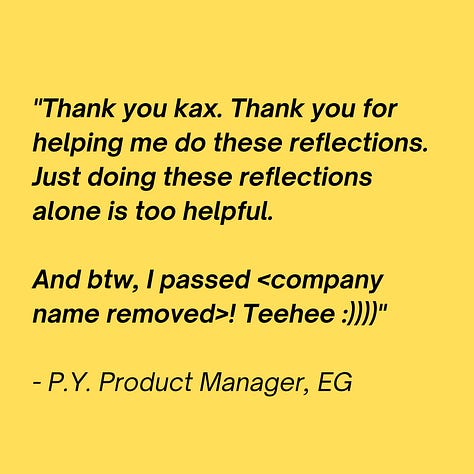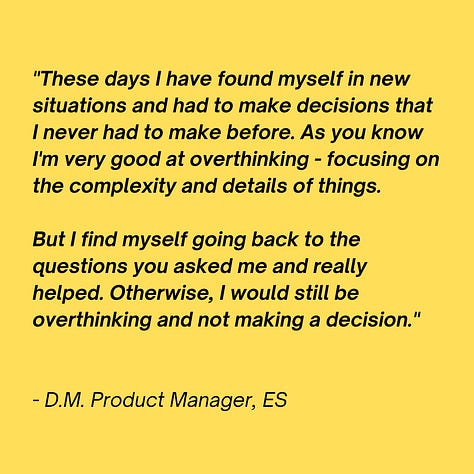Issue #30: How to receive feedback. Mindset and behavior tricks to learn to receive feedback with grace.
Or what to do when the feedback we receive hurts more than it helps and when we don't agree with it.
Hola friends! 👋
This week’s thoughts and feelings include:
How to receive feedback. Mindset and Behavior tricks to learn to receive feedback with grace.
5 things to help you this week
PSA: You Don’t Have To Face Your Challenges Alone!
This week, I’m sending my newsletter from Portugal! 🇵🇹 I’m finally on my summer break. And to be honest, it was very tempting to skip this week’s newsletter and hide behind the excuse of “I’m on holiday! See you when I get back!”
But I didn’t skip. Because it’s Issue #30! 🎉 And round numbers make me giddy!
01 How to receive feedback with grace, especially when it can hurt us. 💙
Last week, I had a chat with one of the Product Managers I’m coaching about the feedback they recently received that really left a mark on them - and not in a good way. They described the feedback as hurtful and difficult to take.
Apart from not agreeing with the feedback and thinking it was unfair. There was also the concern that any future interaction with the feedback giver will be awkward as they’re no longer sure how to act around them.
And to make the situation even more stressful, this Product Manager is worried that receiving strong negative feedback like this one can hurt their chances of promotion later on.
Raise your hand if you can relate! 🙋🏻♀️ I certainly can.
Feedback, they say, is a gift. Something we all should be open to receiving as it’s essential for our career growth and personal development.
But what do we do when the feedback we’re given kind of… sucks? Or worse, when it wounds?
Well, we process.
So let me share with you 4 mindset reminders to help frame negative feedback in a more productive way 🧘
Assume best intentions. Yes, there will always be assholes. Let’s just get that out of the way. But 99.9% of people giving feedback do so because they truly want to see things get better. Most people will not set out to give feedback to hurt other people.
Feedback is perception. We give feedback to people because of how their actions impacted us and made us feel. People have different tolerances, biases, and values. While a person’s behavior may be consistent, the way we react to their behavior will be not. And our reactions are what we base our feedback on. This is important to remember when we are on the receiving end.
Feedback, especially when constructive, is always good for us. It can show us our gaps and our impact on other people (both positive and negative) - especially the ones that we don’t see or the ones we sweep under the rug. And this kind of awareness, when taken advantage of, can bring us growth.
Receiving feedback with open-mindedness and with calm is a skill. That means this can be learned and improved. Of course, negative feedback can hurt, especially if we’re not used to it. But the better we understand the value of this feedback, the more we expose ourselves to receiving them — then the bigger the steps we can take toward our growth.
Our actions can also help put us in the right mindset so we can process feedback better. So here are 6 things we can do 🫶
Actively listen. Listen to understand and not to defend. Be fully present in the conversation. Take notes if needed so it can help ground us to the moment and break down the message we’re getting.
Ask clarifying questions and examples. This is especially important for feedback that has not been framed more constructively. We must ask questions to understand better the circumstances of our actions that generated the feedback we got. Ask about the what, when, and how.
Summarize their feedback back to them. Repeating back to the giver their feedback is a good exercise to show how well we’ve understood what they told us. To make sure that we’re on the same page. The worst thing that can happen is that we take away something very different from what they were trying to tell us.
Thank the person for their feedback. It can be counterintuitive. Especially when the person giving us feedback is saying hurtful things. Why should we be appreciative of that??? But it’s important to remember that for most people, giving feedback is a difficult exercise. Thanking them for their effort will encourage them to give us more feedback moving forward. And I promise that getting negative feedback is a lot better than getting no feedback at all.
Decide what to do with the feedback you received. Feedback is a gift. And just like all gifts, some are useful and they will be worth keeping or acting on. But while some are not, they’re still worth receiving (and maybe setting aside, for now, to revisit later) to show the giver that we value their gift. And sometimes, the recognition and acceptance of the feedback is really what the giver needs from us.
Validate the feedback with other people. There will be times when we don’t really trust the feedback we receive, or in some cases, the people who gave them to us. This is normal. When this happens, it’s worth cross-checking the feedback with the people we trust. I like to think of it as getting a 2nd opinion vs immediately dismissing the feedback or overthinking it.
***
Here’s the reality, the more senior we become in our roles, the more feedback we’ll receive from more people of all levels and functions.
For people managers, we pretty much receive feedback from our team every single day, and even feedback from their peers too. And these are on top of feedback from our peers, our manager, and our manager’s manager.
When it comes to the feedback itself — some of them, we will agree with. Unfortunately, some of them will feel like a knife straight to the gullet.
For people pleasers like me, receiving bad feedback can send us into a spiral of overthinking and overcompensating for the offense we committed. But it doesn’t have to be this way. We don’t have to be reactive to the feedback we get.
Learning how to receive feedback well is critical for our growth.
But constantly being on defense or being triggered every time we receive negative feedback can be a source of stress and block us from creating a safe space for our team to share their thoughts, feelings, and violent reactions.
So it’s really important for us to learn how to receive negative feedback with poise, grace, and relative objectivity so we can act accordingly.
Got more tips? Share in the comments below 🙏
***
Since it’s mid-year Review season, now is a great opportunity to ask for feedback from the people we work with!
If you’re unsure how to ask for them, here are the 3 questions I always use to ask for feedback.
What are the things you think I should keep doing to help you and our organization become successful?
What are the things you think I should start doing to help you and our organization become successful?
What are the things you think I should stop doing that are not helping you and our organization become successful?
And because it’s MYR season, are you finding it challenging to process feedback that you’ve been given? Let’s chat! I’d love to help you make the feedback you received actionable and turn it into a development plan for your career growth.
02 Five things to help you this week 🤓
Product Management IRL ‘s post on prioritizing quality for Product Managers.
Product Party ‘s reminder that Product Management processes are not just for us to plug and play and then forget about it afterward.
Adventures in Storytelling ‘s post on the 3 common storytelling roadblocks that we all face
Our personality types can influence our productivity. Because of course, they can!
PSA: You Don’t Have To Face Your Challenges Alone! 💪
Hey Product Manager,
Are you feeling stuck in your current role and unsure how to get to your next step?
Maybe, you’re struggling with self-doubt, imposter syndrome, or other self-limiting beliefs that are holding you back from having big dreams or taking bold steps.
Or you’re finding it difficult to keep up with the latest tools, frameworks, trends, and technologies, and you feel like you're always one step behind everybody else?
And I can imagine you’ve already tried different ways to help you find your footing and move forward and upward. You’ve enrolled in all the courses and workshops and you’ve attended the webinars and the relevant conferences. But nothing’s working. Things still feel hard.
I’ve been there! The challenges. The quest for solutions.
But in my 10+ years of working in Product Management, and the many struggles in between, there’s one thing that I’ve learned that helped me get out of my rut and finally propel my career forward - We don’t have to figure things out alone!
If you’re wondering what it’s like to work with me, here’s what some of my clients have to say about our sessions:



If you were looking for a sign on whether or not it’s time to work with a coach, this is it!
I would be very excited to give you the support that you need to thrive in your Product career. How does that sound?
Curious to know more? You can read more about my coaching or you can just book a call with me and let’s talk about what we can accomplish together! Looking forward to hearing from you!
💙
Kax



Great post and thanks for the shout! I found it pretty hard to get feedback early on. It's definitely a skill one needs to work on. I now try to foster my relationships in a way that would make it friendly for trading feedback.
Thank you for helping accept tough feedback - product managers get a lot of feedback !
Appreciate the shout out to Product Management IRL!